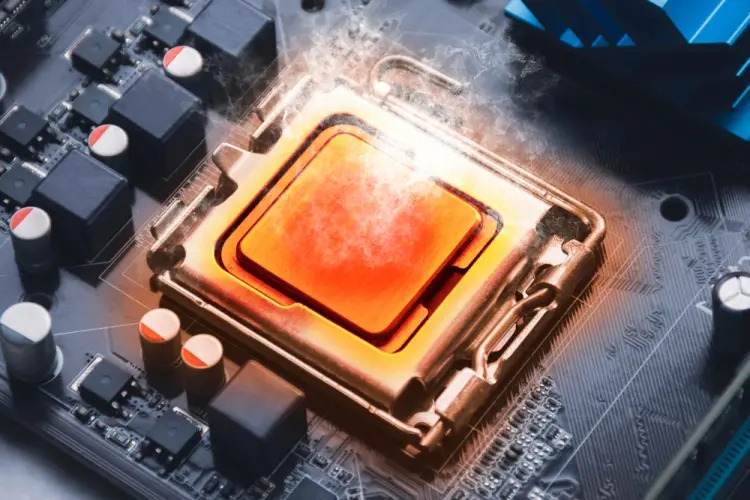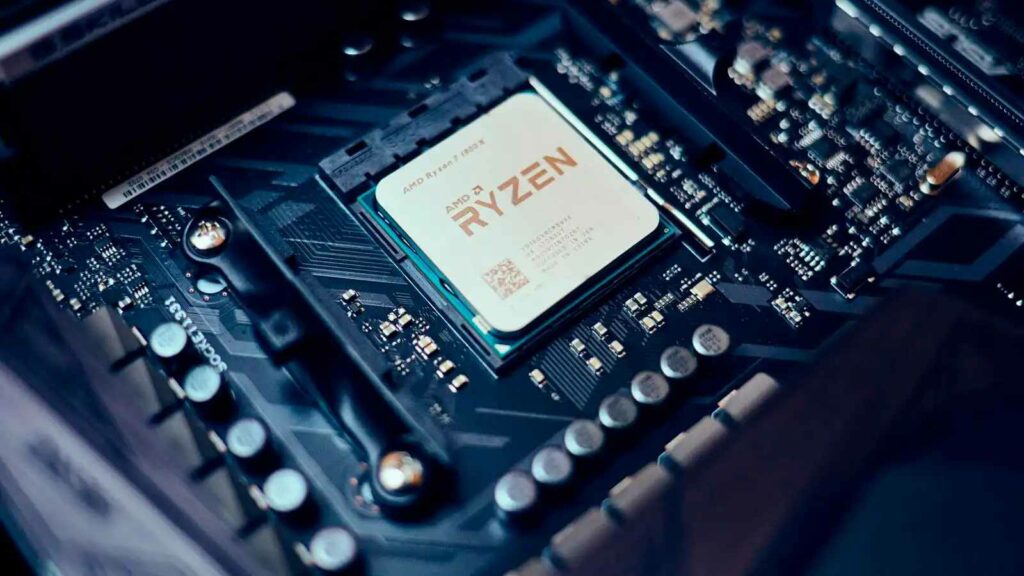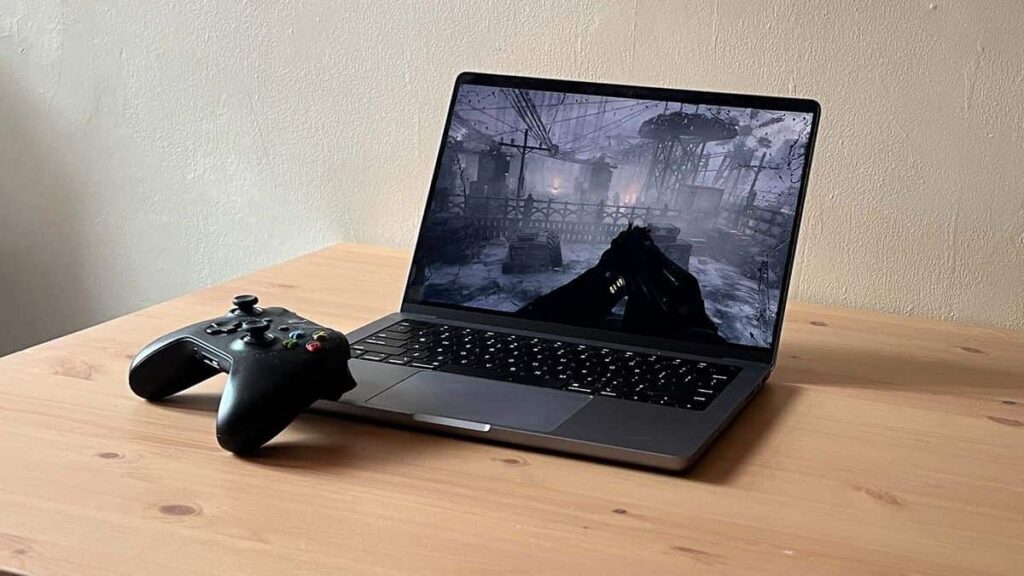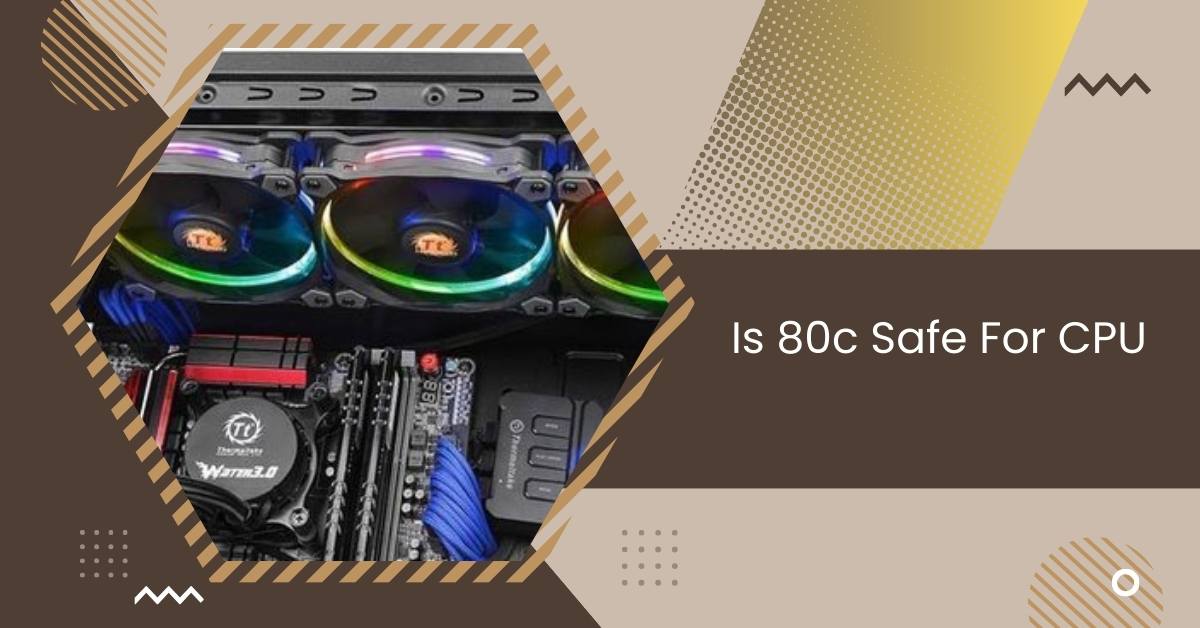In the world of computing, the temperature of your CPU (Central Processing Unit) is a critical factor that directly impacts performance and longevity.
Yes, usually 80°C is safe for a CPU. It’s a bit high but still within the safe range for many processors. Just keep an eye on it if it stays at that temperature for a long time.
Let’s dig into this and look at how to manage CPU temperature.
Is 80c A Safe CPU Temp
Yes, 80°C is generally safe for a CPU. It’s within the normal operating range for many processors. Just make sure it doesn’t stay at 80°C for too long to avoid potential issues.
Is 80c Safe For CPU While Gaming
Yes, 80°C is safe for a CPU while gaming. Most CPUs can handle this temperature under heavy loads. Just ensure it doesn’t consistently stay at 80°C for extended periods.
Is 80c Safe For CPU While Gaming Laptop

Yes, 80°C is generally safe for a CPU in a gaming laptop. Laptops are designed to handle higher temperatures, but it’s essential to ensure proper cooling to avoid long-term damage.
My CPU Hits 80 Degrees When In Games, Is It Bad?
No, reaching 80 degrees Celsius while gaming is not necessarily bad. It’s within a safe range for many CPUs. But if it consistently stays at that temperature, you should improve cooling.
Is 80c On The Cpu Very Bad?
No, 80°C on the CPU isn’t very bad. It’s within a safe range for many processors. But if it stays at 80°C for long periods, it could impact performance and longevity.
Can We Stop Telling People Its Normal To Run At 80c
Yes, we should reconsider saying it’s expected to run at 80°C. While some CPUs can handle it, sustained high temperatures can affect performance and lifespan. It’s better to aim for lower temperatures through proper cooling to maintain a healthier CPU.
Read Also: Is 50c Good For CPU – A Complete Overview – 2024!
Is ~80c Every Day Bad For My Cpu?
Operating your CPU at around 80°C every day isn’t ideal. While it’s within the safe range for many CPUs, prolonged exposure to high temperatures can reduce longevity. Aim to lower temperatures through improved cooling for better CPU health.
Is 100% CPU Usage And 80 Celcius Temp Safe?
Operating your CPU at 100% usage and reaching 80°C temperature is generally safe for short periods. However, sustained high temperatures and usage levels may affect long-term reliability. It’s advisable to balance workload and temperature for optimal performance and longevity.
Is It Ok To Have Your Cpu Around 80 Degrees Celcius

Yes, having your CPU around 80 degrees Celsius is generally okay, especially under heavy loads like gaming or rendering. However, consistently high temperatures could impact long-term performance, so it’s best to ensure proper cooling.
Why Does My CPU Hover At Around 80°c While Gaming?
Your CPU may hover around 80°C while gaming due to the intensive demands placed on it. Gaming tasks require the CPU to work harder, generating more heat. Ensure proper cooling and ventilation to maintain optimal performance and prevent overheating.
Is 80c Normal For Amd Ryzen Stock Cooler During Gaming?
Yes, it’s normal for an AMD Ryzen CPU with a stock cooler to reach around 80°C during gaming. The stock cooler is designed to handle moderate temperatures, but upgrading to a better cooler can help reduce temperatures further if desired.
Is 80c To Hot For A Cpu When Gaming?
While 80°C is on the warmer side, it’s generally not too hot for a CPU during gaming. Many CPUs can safely handle this temperature under heavy loads. However, ensure adequate cooling to prevent prolonged exposure to high temperatures.
Read Also: Is 60c Safe For CPU – Is 60°C Within Safe Limits for CPU!
I3-10100f Reaching 80c During Gaming Sessions. Is It Safe?
If your i3-10100F is reaching 80°C during gaming sessions, it’s generally safe. However, it’s advisable to monitor temperatures to ensure they don’t consistently exceed this level and maintain optimal performance and longevity.
Can Your CPU Get Damaged If It’s Routinely At 70-80 Degrees Celsius?
Routinely operating your CPU at 70-80 degrees Celsius shouldn’t cause immediate damage. However, prolonged exposure to these temperatures may contribute to wear and tear over time, potentially affecting long-term performance and lifespan. It’s best to maintain lower temperatures when possible.
Is 80 Degrees Celsius Hot For A CPU?
Yes, 80 degrees Celsius is considered hot for a CPU, but it’s within the safe operating range for many processors. However, sustained high temperatures can impact performance and lifespan, so it’s essential to monitor and manage temperatures to avoid potential issues.
Is 70c Safe For Cpu

Yes, 70°C is generally safe for a CPU. Many processors can operate effectively within this temperature range without experiencing any issues. However, it’s essential to ensure proper cooling and ventilation to maintain optimal performance and longevity.
Is 75c Safe For Cpu
Yes, 75°C is typically safe for a CPU. Most processors can operate within this temperature range without encountering problems. However, it’s important to monitor temperatures and ensure adequate cooling to maintain optimal performance and prevent overheating.
Read Also: Is 90c Safe For CPU – Is 90°C Harmful to Your CPU? Find Out!
Is CPU Temperature 80 Too High?
A CPU temperature of 80°C is considered on the higher side, but it’s generally not too high. Many CPUs can handle this temperature under load. However, prolonged exposure to temperatures this high could impact performance and longevity, so it’s best to keep it lower if possible.
Is 81c Too Hot For CPU?
Yes, 81°C is too hot for a CPU. While some processors can withstand higher temperatures, sustained operation at 81°C may lead to performance issues and potentially shorten the CPU’s lifespan.
Is 90c Safe For Cpu?
No, 90°C is not safe for a CPU. Operating at this temperature can lead to overheating, performance throttling, and potentially damage the processor. It’s crucial to address cooling issues and ensure temperatures remain within safe limits for optimal CPU health and performance.
Is GPU at 80c Bad?
Having a GPU at 80°C isn’t necessarily bad, but it’s on the warmer side. Most GPUs can handle this temperature, but prolonged exposure may affect performance and lifespan. Ensure proper cooling to maintain optimal GPU health and performance.
Read Also: Is 60 Degrees Celsius Hot For A CPU – Ultimate Guide – 2024!
Is 80c Too Hot For GPU?
Yes, 80°C is considered too hot for a GPU. While some GPUs can handle higher temperatures, sustained operation at 80°C or above may lead to performance issues and potentially damage the graphics card. It’s essential to address cooling concerns to maintain GPU health.
Is 80c Ok While Gaming?
Yes, 80°C is generally okay for a CPU or GPU while gaming. Many processors and graphics cards can operate safely within this temperature range under heavy loads. However, it’s essential to ensure proper cooling to prevent overheating-related issues.
Is 80c Ok For 3080?
Yes, 80°C is generally acceptable for an NVIDIA RTX 3080 GPU while gaming. However, it’s essential to monitor temperatures and ensure adequate cooling to maintain optimal performance and prevent potential thermal issues.
Is 82 C Bad For Cpu?
Yes, 82°C is on the higher side for a CPU. While it may not immediately damage the CPU, prolonged operation at this temperature could lead to performance issues and potentially impact the CPU’s lifespan. It’s advisable to keep temperatures lower for better CPU health.
Is 60 C bad for laptop?
No, 60°C is not considered harmful for a laptop. It’s within a safe temperature range for most laptops under normal operating conditions. However, consistently high temperatures above 90°C could indicate potential issues that need to be addressed.
Is 85C OK for laptop?

Yes, 85°C is generally acceptable for a laptop under heavy loads. While it’s on the warmer side, many laptops can handle this temperature without encountering issues. However, consistent temperatures above 90°C may warrant further attention to prevent overheating.
Is 95C bad for laptop?
Yes, 95°C is considered harmful for a laptop. Operating at this temperature for prolonged periods can lead to overheating, potential damage to internal components, and performance issues. It’s essential to address the cooling problems to maintain laptop health.
Read Also: 4080 CPU Bottleneck – A Comprehensive Guide – 2024!
Is 100 Celsius bad for laptop?
Yes, 100°C is very bad for a laptop. It indicates severe overheating and can potentially damage internal components, leading to performance issues or even permanent damage. Immediate action should be taken to address cooling problems and lower temperatures.
Is 90c on a laptop normal?
No, 90°C on a laptop is not considered standard. While some laptops may reach this temperature under heavy loads, it’s generally too high and could indicate cooling issues. It’s advisable to address these issues to prevent potential damage to the laptop.
How long can CPU run at 90c?
Running a CPU at 90°C for an extended period isn’t advisable. While modern CPUs can handle high temperatures, sustained exposure to 90°C may lead to performance issues or even damage over time.
Is 90c while gaming bad?
Yes, 90°C while gaming is generally considered too hot. While some CPUs and GPUs can withstand this temperature temporarily, prolonged exposure may lead to performance issues or even damage to components.
FAQs
1. What happens if my CPU reaches 80C?
Operating at 80°C may lead to thermal throttling, reduced performance, and potential damage to the CPU over time.
2. Can high CPU temperatures cause permanent damage?
Yes, prolonged exposure to high temperatures can cause thermal degradation of internal components, leading to hardware failure.
3. How often should I check my CPU temperature?
It’s recommended to check CPU temperature regularly, especially during heavy usage or after installing new hardware.
4. Is it normal for my CPU to reach 80C during gaming?
While gaming can put a heavy load on the CPU, reaching 80°C may indicate inadequate cooling or ventilation.
5. What are the signs of CPU overheating?
Signs of CPU overheating include system instability, frequent crashes, and unusually high CPU temperatures during regular operation.
6. Is there any evidence that running PC components at temperatures higher than +80c actually affect the lifespan of said components like CPU or GPU?
Research suggests that prolonged exposure to temperatures above 80°C can impact the lifespan of CPU and GPU components. It’s essential to monitor and manage temperatures to maintain optimal performance and longevity.
Conclusion
In conclusion, maintaining optimal CPU and GPU temperatures is crucial for performance and longevity. While temperatures around 80°C are generally safe, consistently high temperatures above 90°C can lead to overheating-related issues and potential damage to internal components. It’s important to monitor temperatures and ensure proper cooling to prevent such problems.
Also Read
- 3060 CPU Bottleneck – Upgrade For Better Gaming In 2024!
- Can A Motherboard Bottleneck A CPU – Avoid Bottleneck Risks!
- Is 40c Good For CPU – Find Out If 40°C Perfect Temperature!

Hi everyone, Johns Jack here, your approachable tech aficionado! I’m passionate about CPUs and thrive on keeping up with the newest tech developments. Join me as we delve into the dynamic realm of technology! Visit: Techy Impacts

